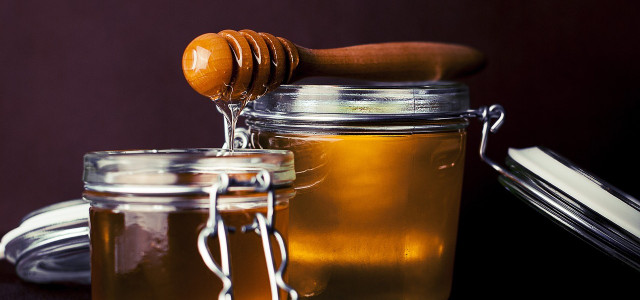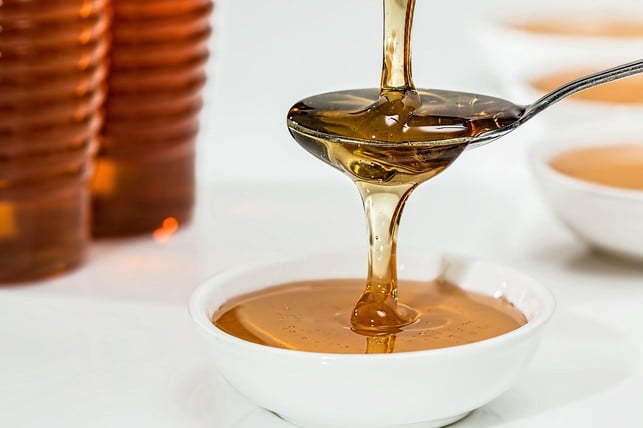
It is a widespread belief that honey is healthier than sugar. After all, honey is considered the more natural product. You can find out what’s actually true about this claim here.
Is honey healthier than sugar? Many people ask themselves this question when they change their diet and, above all, want to eat less sugar. Then it would of course be particularly easy to simply replace the sugar with honey.
But does that really do anything? We’ll show you how honey compares to beet and cane sugar.
Is honey healthier than sugar? The facts
Honey ultimately consists of various types of sugar and water. About 80 percent of honey consists of sugar. The main types of sugar are fructose and glucose. These are exactly the two types of sugar that are found in sucrose, i.e. white table sugar.
The remaining 20 percent is mostly water. Honey is therefore primarily a sugar solution, the nutritional values of which hardly differ from conventional sucrose.
Sucrose as the main ingredient
The typical white household sugar in this country consists of sugar beets. Accordingly, it is also known as beet sugar. On the other hand, cane sugar, raw cane sugar or whole cane sugar is made from sugar cane. Due to its brown color, it is considered more “natural” and healthier. In fact, in all three cases it is mainly just sucrose.
Unrefined sugar, i.e. whole cane sugar such as panela and jaggery, or maple syrup, still contains some vitamins and minerals thanks to their plant origin. In addition to sucrose, honey also contains some potassium, vitamin C and iron. However, in such small quantities that you will never be able to cover your nutritional needs with sugar – no matter what form it takes – nor will you suffer from a nutrient deficiency just because you use refined white sugar instead of whole cane sugar or honey.
According to the Federal Center for Nutrition, all of these products have the same effect on our blood sugar levels. Because when we ingest it, the body treats every form of sucrose in the same way: it breaks it down into its components fructose and glucose.
You can find further information about different sweeteners here:
Honey vs. Sugar: Which is Better for the Planet?

(Photo: CC0 / Pixabay / stevepb)
So honey is no healthier than beet sugar or cane sugar. Nevertheless, due to its characteristic aroma and consistency, honey is popular as a sweetener for teas or as a spread on bread, among other things. But which sweet substance is actually better for the environment?
In a comparison between beet and cane sugar, beet sugar clearly performs better in terms of its ecological balance. That’s why:
- Because sugar cane only grows in tropical areas. In the worst case scenario, rainforests will be cut down to grow sugar cane. In the best case scenario, the sugar cane is grown and processed in a fair and environmentally friendly way, but it has to travel a long way to get to Germany. Emissions from transportation make cane sugar a relatively unsustainable option.
-
However, sugar beets can also be grown in Germany. According to analyzes by the Research Institute for Organic Agriculture (PDF download), regional organic beet sugar from southern Germany pollutes the environment by around a third less than organic cane sugar from Paraguay. This is not only due to significantly shorter transport routes, but also because more environmentally friendly fertilizers are used and processing is more efficient.
How environmentally friendly honey is depends entirely on its origin. In supermarkets you can often find a mixture of honey that comes from very different parts of the world. The origin is usually not clearly declared on the label. In this case, honey products often have to travel long distances and therefore cause high CO₂ emissions.
If you use regional organic honey from the beekeeping around the corner, the ecological balance is significantly better. At the same time, you support local organic farming. You can find more facts about honey here:
We recommend paying attention to organic products for all food, including all sugar and honey products. In this way, you promote sustainable agriculture that avoids the use of chemical-synthetic pesticides.
Read more on Techzle\.com:
- Vegan honey: The 6 best alternatives to bee honey
- Types of honey at a glance: You should know these
- Honey – from the beekeeper next door, organic or fair trade – a comparison
** marked with ** or orange underlined Links to sources of supply are partly partner links: If you buy here, you are actively supporting Techzle\.com, because we then receive a small part of the sales proceeds. More info.